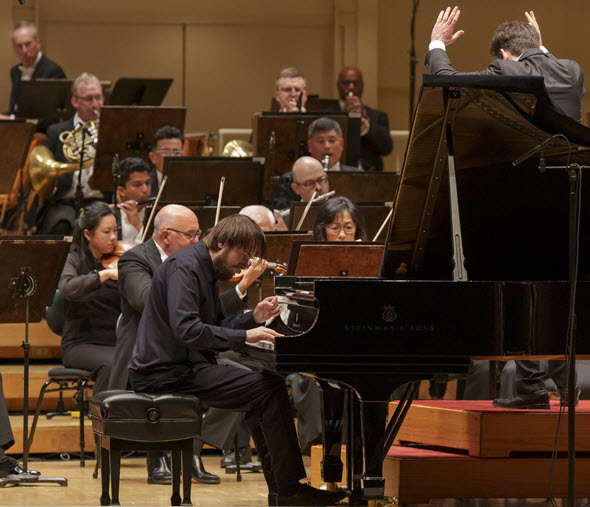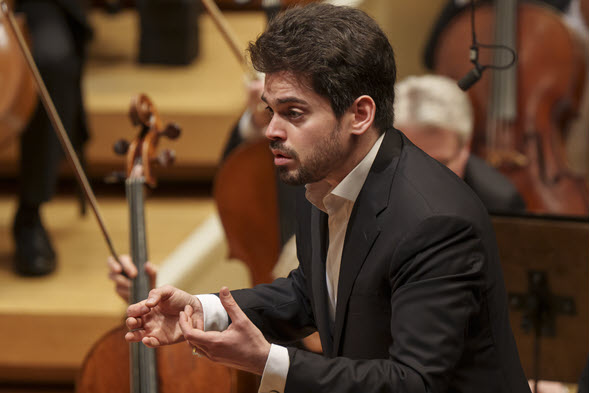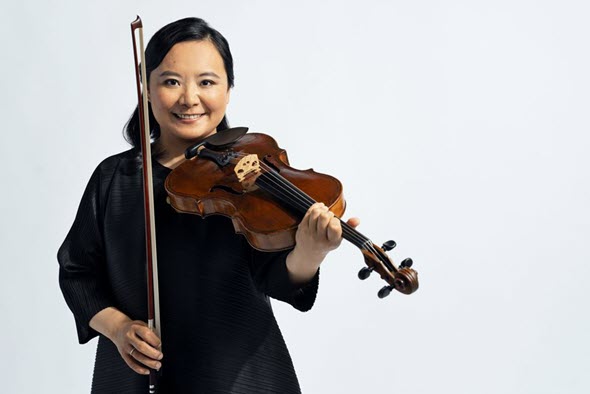CSO finale’s convergence of three young stars signaled new energy heading into Mäkelä era
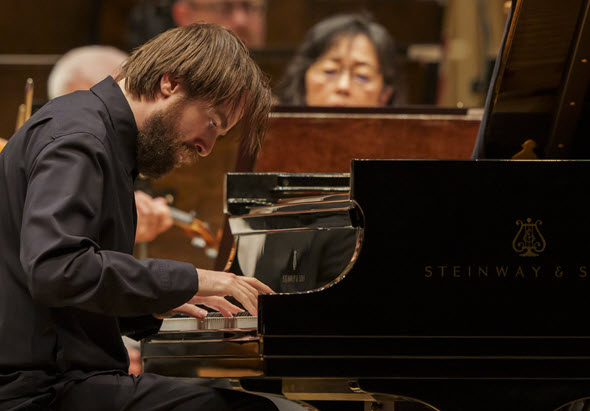
Russian pianist Daniil Trifonov performed the Chicago Symphony Orchestra premiere of a piano concerto by Mason Bates, the CSO’s former composer in residence. (Todd Rosenberg CSO photos)
Commentary: The concert brought together new-generation pianist Daniil Trifonov, conductor Lahav Shani and composer Mason Bates.
By Nancy Malitz
The Chicago Symphony Orchestra’s 2023-24 season, just ended at Symphony Center, has been the most electrifying in recent memory. The 133-year-old ensemble, founded in 1891, opened its season with a fabulous triumph of octogenarians. And yet the vibe has been distinctly young.
On September 28, 2023, 82-year-old Riccardo Muti conducted the world premiere of a new work by Philip Glass honoring the conductor’s transition from CSO music director after 13 seasons to his new role as music director emeritus for life. Glass, who is Muti’s elder at 86, is one of the most popular and prolific composers alive, and his new commission “The Triumph of the Octagon” was a shimmering musical beauty, riddled with an elusive syncopation scheme that kept the maestro on his toes.
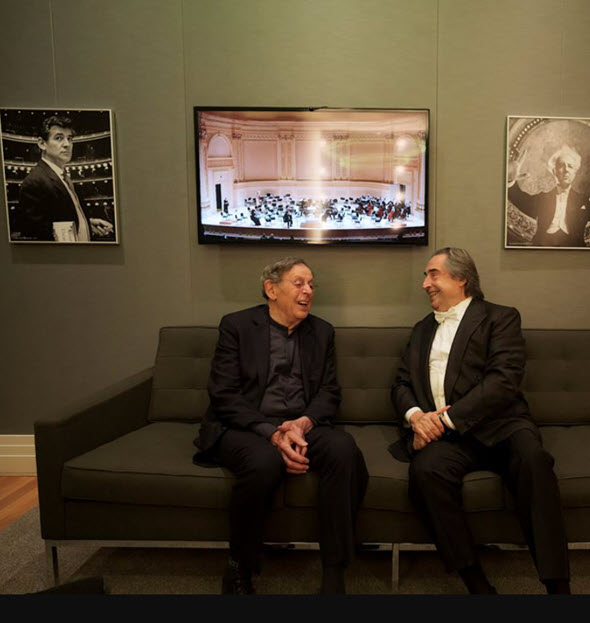
Triumph of the elders: Glass, Muti at Carnegie Hall in October 2023 when the CSO played Glass’ “The Triumph of the Octagon.” Muti later took the work to Europe. (Todd Rosenberg)
Glass’s tone poem was inspired by a tranquil photo in Muti’s studio of an eight-sided 13th-century castle that looked out to sea from Muti’s beloved home region in the heel of the Italian boot. The composer and conductor bonded over the concept, the lovely result played to packed houses, and Muti took the CSO and Glass’ new work on an extended tour to Carnegie Hall, Brussels, Paris, Budapest and Turin.
Fast forwarding to summer 2024, the CSO ended its season with the local premiere of a new contemporary hit by another highly popular composer, Mason Bates, also known as DJ Masonic, who was appointed by Muti as CSO composer in residence back in 2010. Four decades younger than both Glass and Muti, Bates’ career has soared, and his new Piano Concerto was introduced to CSO audiences on June 20 by the astounding Russian soloist Daniil Trifonov, at 33 the leading pianist of his generation.
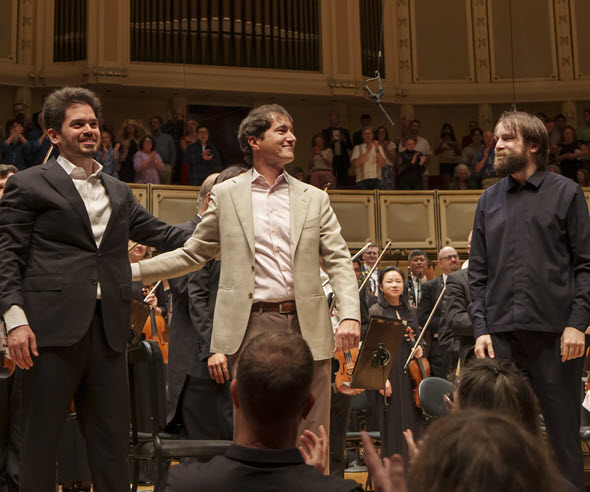
Emerging stars: Composer Mason Bates, center, at the CSO premiere of his Piano Concerto, with soloist Daniil Trifonov, at right, and conductor Lahav Shani, left, in Orchestra Hall.
Conducting the CSO was the young Israeli Lahav Shani, 35, whose aggressive style recalls Daniel Barenboim, whom he resembles. Shani had charmed the CSO audience two seasons back in a fiery program including Prokofiev’s First Symphony; he even took a spontaneous turn at the piano in a four-hand encore of Tchaikovsky’s “Waltz of the Sugar Plum Fairy” with guest pianist Beatrice Rana.
A new generation is making the CSO its own. The signs are certainly promising, the groundwork carefully laid. Bates, now 47, was a popular CSO composer in residence from 2010 to 2015, and his novel collaborations with Muti gained considerable traction. Bates’ first CSO composition, “Alternative Energy,” was inspired by the composer’s visit to the Batavia Fermilab subatomic particle accelerator 35 miles west of Chicago, where scientists believe they are on track to identify a fifth fundamental force of nature in addition to gravity, electromagnetism, nuclear force and radioactive decay.
Another Bates composition, “Anthology of Fantastic Zoology” – “a kind of psychedelic ‘Carnival of the Animals,’” as the composer once put it – was recorded live in 2015 and dedicated to Muti. It is available via YouTube, below. The work displays Bates’ beat-driven rhythmic schemes, and his essential tonal world, along with a highly imaginative harmonic palette that some would call film-like, if not operatic, and it fit Muti’s own sensibilities especially well.
Chicago’s aspiring young composers and pre-professional musicians have always shown up in big numbers at Muti’s CSO concerts, as they do for guests artists in their ’20s and ’30s especially. The Windy City sports four important universities with strong instrumental and composition departments. The current CSO composer in residence is Jessie Montgomery who reaches out to these young cadres in advanced training at Northwestern University, University of Chicago, DePaul and Roosevelt Universities. Bates always did the same.
These local traditions, along with the orchestra’s stunning choice of Finnish superstar Klaus Mäkelä, 28, to succeed Muti in September 2027, promise to help keep the audience green.
Bates’ new Piano Concerto was composed during the pandemic for Trifonov, who performed the world premiere in 2022 with the Philadelphia Orchestra and has since been taking it worldwide to orchestras such as the Israel Philharmonic, San Francisco Symphony, Rotterdam Philharmonic, Philharmonique de Radio France, Rome’s Santa Cecilia Orchestra dell’Accademia Nazionale and Berlin’s Deutsches Symphonie-Orchester. The Bates concerto is obviously second nature for Trifonov at this point; his intent is clear in every gesture, responsive to the pleasantly antique tone of the first movement, reminiscent of a Renaissance country dance.
The mood turns pleading and combative in the second movement, rather like a scene from a Shakespeare play involving two players with separate agendas who gradually find a way to come to terms. The finale is a wild ride, and a doff of the cap to Glass perhaps, maniacally driving, with cleverly off-kilter beats.
Below is a jargon-free video, mostly in English, about the concerto’s Italian premiere with Trifonov, conductor Jakub Hrůša and the Santa Cecilia Orchestra in May. Hrůša seems as keen about Bates as Muti has been, and the composer is hardly alone in infusing a broadly tonal popular style with a quirky beat into the classical strain. Composers have been drawing inspiration from the plucky sounds of each new generation since the bawdy ballads of Henry Purcell’s day.
Even if Shani did not resemble Barenboim physically, his CSO performance might have put some longtime subscribers in mind of the brilliant former music director of the CSO from 1991-2006. Much like the polymath, conductor and pianist that Barenboim was, Shani is also considered a multiple musical threat – conductor, composer, double bassist, pianist. He debuted with the Israel Philharmonic as piano soloist when he was still a teen, and he performed with the ensemble regularly as a double bassist before his conducting career took off.
Shani is now on the international podium A-list, with the leading orchestras in Chicago, Berlin, London and Vienna under his belt. But after opening the Chicago concert with the exquisite and soulful 10-minute “Prayer” by the 97-year-old Israeli composer Tzvi Avni, and after meeting Daniil Trifonov needs impeccably, Shani took Tchaikovsky’s “Pathétique” in a baffling direction that pretty much bypassed the introspection and longing, the sense of that grand summing that is the essence of its aching greatness. No doubt Shani has a great argument for it, but the counterintuitive coolness of his choices, and over-determined forward drive, defied easy understanding. The CSO strings are capable of so much more than the conductor asked. There was no lingering the exquisite intensity of the “Pathétique’s” all-encompassing awe and sadness.
As for tempos in general, future orchestra musicians in training who might have been in the audience can consider themselves warned. Faster is generally harder, and the “Pathétique” is a standard audition test with its intricate, tricky passages for bassoon, clarinet, cello and viola. The earth’s temperature is rising whether we like it or not. Apparently orchestral tempos will continue to rise as well.
Postscript: The CSO has finally found its new principal viola after long years of waiting, and she was sitting in the designated first chair at this concert: The Chinese-Canadian violist Teng Li, who has been a guest leader with the CSO several times of late, was vetted by both Muti and music director designate Klaus Mäkelä in their own recent appearances here. Teng Li will be leading the section next season after former stints as principal with the Toronto Symphony and the Los Angeles Philharmonic. In the opening moments of the Tchaikovsky, the violas sounded particularly soulful and grand.

